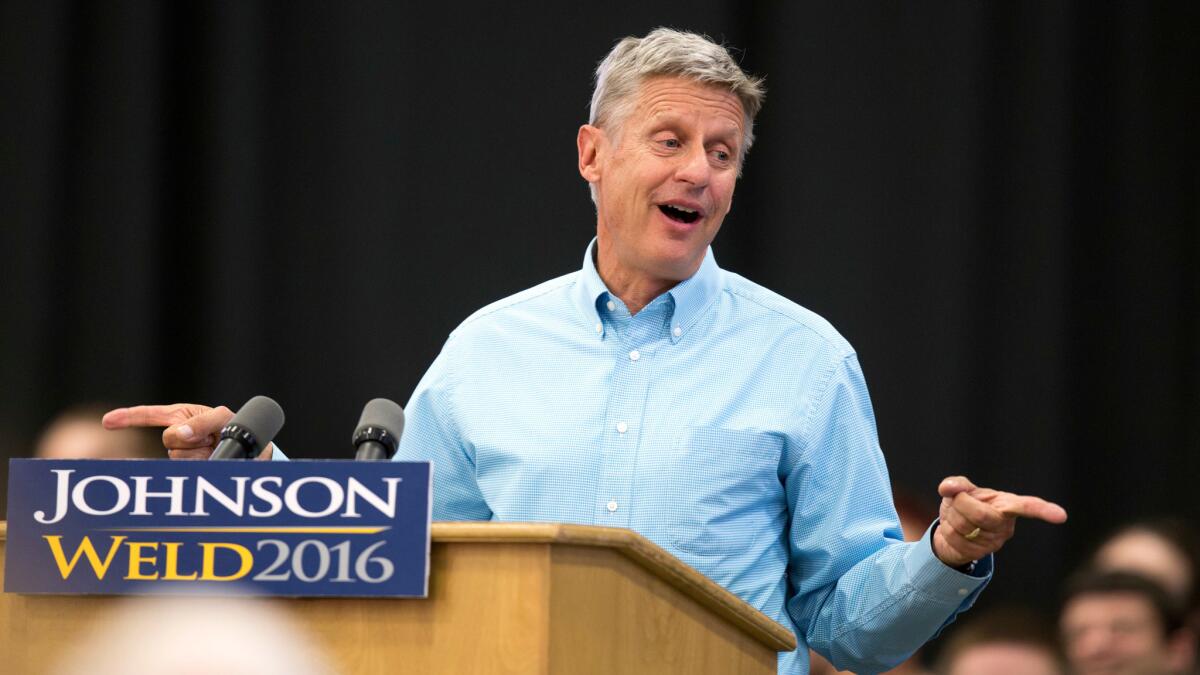Op-Ed: Let Gary Johnson debate

Libertarian presidential candidate Gary Johnson speaks during a campaign rally in Des Moines, Iowa on Sept. 3.
- Share via
A recent Quinnipiac University poll asked likely voters the following question: “Do you think that Gary Johnson, the Libertarian candidate for president, should be included in the presidential debates this year, or not?”
In response, 62% answered “yes.”
Given how unhappy voters are with the two major party candidates, that should come as no surprise. Hillary Clinton and Donald Trump are easily the two most unpopular presidential nominees the broken two-party system has ever put forward, and voters are increasingly frustrated and anxious to find a viable alternative.
Thanks to the electoral college, our national election is really a series of 50 state contests. A national poll is therefore essentially worthless.
For many, former New Mexico Gov. Gary Johnson is that alternative. Of course, I’m biased — I’m Johnson’s campaign manager. But consider that Johnson’s poll numbers are in the double digits in 42 states. The more voters hear from Johnson, the more they seem to like him. That’s why, as the Quinnipiac poll shows, nearly two-thirds of them want to see him share the stage with Trump and Clinton.
You’d think the Commission on Presidential Debates would pay attention. Instead, the CPD has decided that no candidate can participate in the debates unless he or she crosses a 15% average polling threshold. That’s highly problematic.
For starters, the CPD draws that average from five national polls conducted by traditional media outlets that often restrict themselves to head-to-head match-ups between Trump and Clinton. How is Johnson supposed to break through the 15% barrier when his name isn’t even an option?
It’s also worth asking whether these polls are entirely reliable, given that the polling industry is struggling to accommodate new communications technology. In years past, almost all polling was conducted by calling landlines, which have gone the way of the dinosaur. Pollsters are scrambling to incorporate cellphones into the mix, but even that approach ignores the fact that young people spend less time on the phone than they do online. Polls conducted online show more support for Johnson than polls conducted over the phone.
Incidentally, Johnson does particularly well among millennial voters, who are both more likely to be independent of a political party and less likely to own a landline.
Despite all these obstacles, Johnson’s support continues to grow. He has broken through the 15% ceiling in 15 states. In four states, he’s within four to six points of second place.
Besides, thanks to the electoral college, our national election is really a series of 50 state contests. A national poll is therefore essentially worthless when it comes to predicting the winner in November. The next president has to get to the magic number of 270 electoral votes, and Johnson is the only candidate, other than Trump and Clinton, who will be on the ballot in all 50 states. That fact alone ought to convince the CPD to let Johnson debate.
There is also precedent to consider. In 1992, H. Ross Perot polled well through early summer when matched up against then-President George H.W. Bush and Bill Clinton. After he temporarily dropped out of the race, his numbers plummeted, and by the time he got back in he was only at 7 to 9% in national polls. (That’s lower than Johnson by most accounts.) Nevertheless, he was invited to participate in the debates, and he went on to win 18.7% of the popular vote. If voters had not been given the opportunity to see him go head to head with the standard bearers of the obsolete two-party system, he would never have gone so far.
Shouldn’t Johnson get the same chance?
Americans want to make an informed choice, and the debates are the best opportunity they have to learn about those seeking the White House. Voters rightly believe that more information is always better than less — and so do political leaders. Former presidential candidate Mitt Romney, California Gov. Arnold Schwarzenegger, Indiana Gov. Mitch Daniels, and newspapers including the Chicago Tribune, the Boston Herald and the Richmond Times-Dispatch have all called on the CPD to let Johnson and his running mate, Bill Weld, into the debates.
The CPD, a private tax-exempt organization under section 501(c)(3) of the tax code, has the opportunity to do the right thing. If it’s going to use polls to decide who’s in and who’s out, perhaps it should give some weight to the 62% of Americans who want Johnson on that stage.
Ron Nielson is national manager of the Johnson-Weld campaign.
Follow the Opinion section on Twitter @latimesopinion or Facebook
A cure for the common opinion
Get thought-provoking perspectives with our weekly newsletter.
You may occasionally receive promotional content from the Los Angeles Times.






